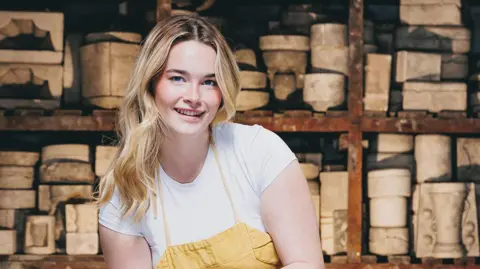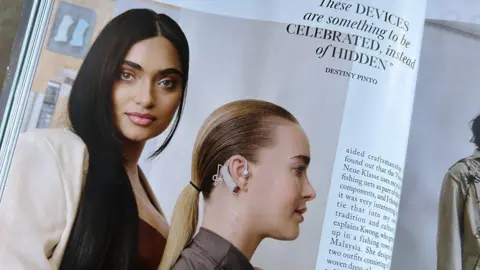Deaf woman models cochlear implant in British Vogue
A young woman with a hearing impairment has featured in British Vogue, modelling designer hearing aid covers.
Imy Harris, 22, from Cheltenham, was featured in the February edition of the world-famous fashion magazine, published on January 15, after working with designer Destiny Pinto, who creates fashionable medical devices.
Ms Pinto recently won the Vogue and BMW Future Creators competition and Ms Harris was chosen to model her designs.
"I had massive imposter syndrome, but it was incredible," said Miss Harris, who has also appeared on this year's series of Channel 4's Great Pottery Throw Down. "So many people will look at that magazine and be able to relate."
 The Great Pottery Throw Down
The Great Pottery Throw DownMiss Harris was born deaf and had two hearing aids but she said she mostly relied on lip reading.
She explained that growing up she did not see anyone like her on television or social media until her late teens.
When face masks were introduced during the Covid-19 pandemic, it meant she found it very difficult to understand people.
She did not want to get a cochlear implant because she was "embarrassed to have something so visual" and "didn't want to embrace it".
However, since having her operation in December 2023, she has felt "amazing".
She said it made her feel "stronger and happier".
"In the last two years I have accepted who I am because I can either be unhappy for 80 years of my life, or accept it and make some change," she added.
Unlike hearing aids, a cochlear implant does not amplify sounds, it sends sound signals directly to the auditory nerve, bypassing damaged parts of the inner ear.
It has external parts including a microphone and speech processor, but it also has an internal receiver which is implanted under the skin behind the ear into the cochlea.
 Imy Harris
Imy Harris'Barriers can be overcome'
When she was recovering from her operation, she decided to apply for season eight of The Great Pottery Throw Down, which aired on 5 January, and made it through the audition process.
"On the first day I was there, they connected my implant, by bluetooth, to the microphone the judges were wearing."
This meant that even if she sat on a far away table she could still hear them.
She said this was a huge positive because "these barriers can be overcome, and people who don't have disabilities get the opportunity to learn about someone who is different".
She added that her mother had supported her the whole way through each journey and that she "wouldn't be here" without her.
Follow BBC Gloucestershire on Facebook, X and Instagram. Send your story ideas to us on email or via WhatsApp on 0800 313 4630.
